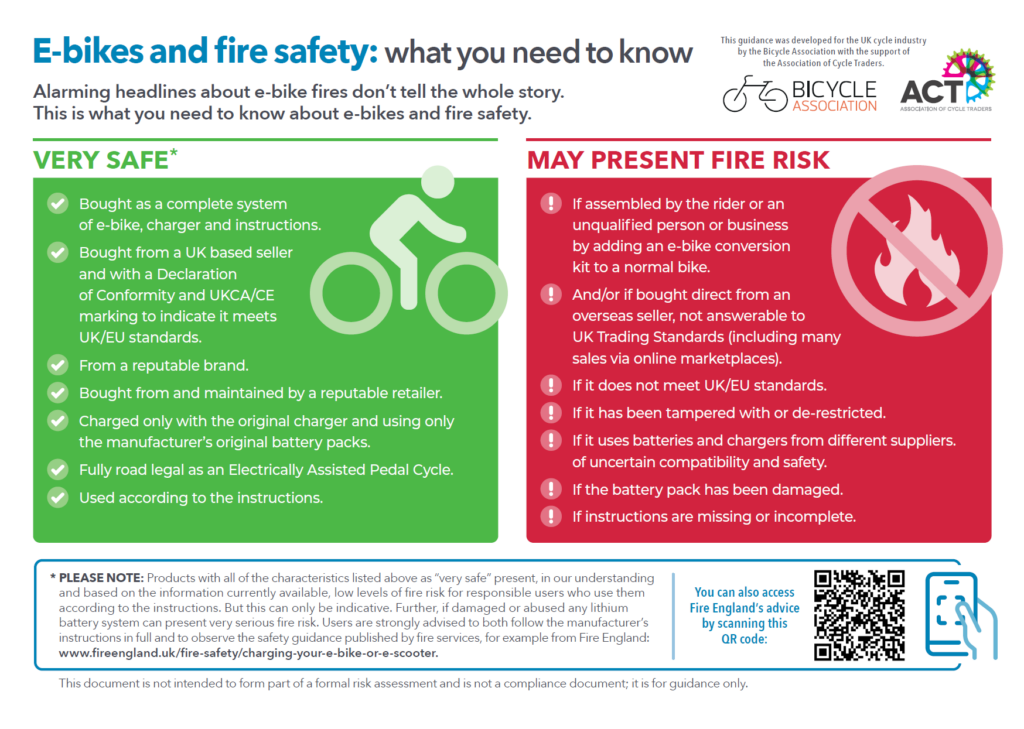Attention: You are using an outdated browser, device or you do not have the latest version of JavaScript downloaded and so this website may not work as expected. Please download the latest software or switch device to avoid further issues.
| 2 Nov 2023 | |
| Press Release |

The two UK cycle industry trade associations, the Bicycle Association and the Association of Cycle Traders, have teamed up to release industry guidance on lithium battery fires and road legal e-bikes
Everyone in the cycle industry will be aware of recent reports and headlines about e-bikes fires, some of which have, sadly, had tragic and even fatal consequences.
Additionally, in recent months a number of fatal collisions have occurred on electric motorcycles which were generally referred to in the media as “e-bikes”.
These reports risk giving the impression to the public, incorrectly in our view, that all such vehicles are unsafe. This could have serious repercussions, potentially putting at risk the growth potential of e-bikes as a transport and climate solution, and deterring e-bike customers at a time when market conditions are already challenging.
Now, the two cycle industry trade bodies in the UK, the Bicycle Association and the Association of Cycle Traders, have issued guidance sheets for the industry, aiming to counter the often misleading media headlines.

The first guidance note summarises statements from fire services and industry experts to clarify the distinction between e-bikes from the reputable industry (which are generally very safe) as opposed to e-bikes, conversion kits, batteries and chargers which may pose significant fire hazard if certain risk factors are present, for example being sourced from overseas via online marketplaces.
These documents are also available to download from the ACT at: https://cycleassociation.uk/e-bikes
The BA and ACT hope this guidance will provide authoritative resources for the industry:
Any company in the cycle industry is welcome to use, print out or distribute these documents freely – but the BA and ACT request that they are not amended.
Peter Eland, Technical and Policy Director at the Bicycle Association, said:
“We hope these resources will set the record straight on the very safe products which our industry provides. Being clear and consistent about battery fire risk factors, and the law around e-bikes, is essential to get the message across.”
Jonathan Harrison from the Association of Cycle Traders said:
“There is a perception that has been allowed to develop that e-bikes are dangerous and it is simply not true. Let’s help educate owners to avoid e-bikes, batteries and chargers that do not meet UK safety standards, and boost awareness of the real safety benefits of buying from a specialist retailer.”
This joint initiative with the ACT is the latest development in the Bicycle Association’s work on these issues. To date this has included:
Further joint industry initiatives are under development and will be announced shortly, say the two trade associations.

Discover how key Bicycle Association initiatives can support your business in 2026. More...

As of Thursday, 1st January 2026, the E-Bike Positive campaign will fall under the joint guardianship of the Bicycle Association (BA) and the Associat… More...

Bronwyn Benstead Joins BA Team, Bringing Expertise and a Fresh Focus More...